

What Is Holistic Psychology? - Holistic Renewal. The following is excerpted from the book, Sing Your Own Song, Dance Your Own Dance: Holistic psychology is a new awakening.
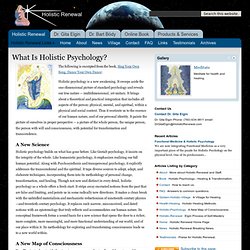
It sweeps aside the one-dimensional picture of standard psychology and reveals our true nature — multidimensional, yet unitary. It brings about a theoretical and practical integration that includes all aspects of the person: physical, mental, and spiritual, within a physical and social context. Thus it reorients us to the essence of our human nature, and of our personal identity. It paints the picture of ourselves in proper perspective — a picture of the whole person, the unique person, the person with will and consciousness, with potential for transformation and transcendence. A New Science Holistic psychology builds on what has gone before. A New Map of Consciousness New Physics took us inside the atom to open up our understanding of the outer world. A Practical Discipline Holistic psychology is meaningful and useful to everyman. Rethinking Mental Health: Towards a Holistic Organismic Paradigm (Part 1 of 4)
Posted on 02 Aug | 3 comments We find ourselves in very interesting times with regard to our understanding of mental health.

We find ever more heated, passionate, and polarized discussions taking place with regard to the so called mental disorders—how or even whether to try to classify them, which factors are generally helpful in recovery vs. which factors are generally harmful, what does “mental disorder” or “mental illness” even mean, and what does “recovery” even mean. I consider myself something of a constructivist (believing that we all develop individually constructed “lenses”), an existentialist (believing in the importance of understanding the core dilemmas inherent within our existence), and a pragmatist (emphasizing the importance of identifying and meeting relevant needs).
This discussion, then, is an attempt to do just that. Part One: The Current Dominant Paradigm—When will Positivism Finally Rest in Peace? -- Paris Williams Read more stories by Paris Williams. Ecotherapy / Nature Therapy. Ecotherapy, also known as nature therapy, is the applied practice of the emergent field of ecopsychology.
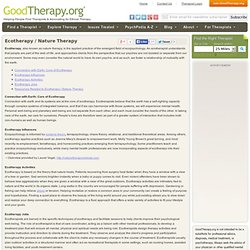
Beyond Words: Nature-therapy in action. Gut feelings: the future of psychiatry may be inside your stomach. Her parents were running out of hope.

Their teenage daughter, Mary, had been diagnosed with a severe case of obsessive–compulsive disorder (OCD), as well as ADHD. They had dragged her to clinics around the country in an effort to thwart the scary, intrusive thoughts and the repetitive behaviors that Mary felt compelled to perform. Even a litany of psychotropic medications didn’t make much difference. It seemed like nothing could stop the relentless nature of Mary’s disorder.
Their last hope for Mary was Boston-area psychiatrist James Greenblatt. Greenblatt started by posing the usual questions about Mary’s background, her childhood, and the onset of her illness. Gut Bacteria Might Guide The Workings Of Our Minds : Shots - Health News. Illustration by Benjamin Arthur for NPR Could the microbes that inhabit our guts help explain that old idea of "gut feelings?

" There's growing evidence that gut bacteria really might influence our minds. "I'm always by profession a skeptic," says Dr. The Gut-Brain Connection, Mental Illness, and Disease. We are never truly alone.
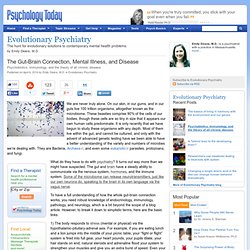
On our skin, in our gums, and in our guts live 100 trillion organisms, altogether known as the microbiome. These beasties comprise 90% of the cells of our bodies, though these cells are so tiny in size that it appears our own human cells predominate. It is only recently that we have begun to study these organisms with any depth. Developmental Psychology. (Below are a few key excerpts from this report, please review the link at the bottom for the full report.) 120 subjects were exposed to a stressful movie, and then to videotapes of either natural or urban settings.
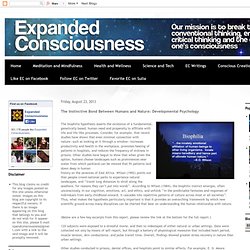
Existential Psychotherapy - A General Overview. General Introduction This overview of existential theory should be considered a postmodern, integrative overview.
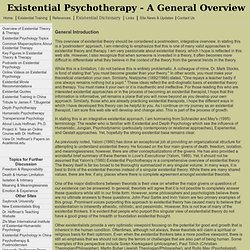
In stating this is a 'postmodern' approach, I am intending to emphasize that this is one of many valid approaches to existential theory and therapy. I am very passionate about existential theory, which I hope is reflected in this web site. However, I also recognize that when someone is invested in a theory, it often becomes more difficult to differentiate what they believe in the context of the theory from the general trends in the theory.
While this is a limitation, I do not believe this is entirely problematic. In stating this is an integrative existential approach, I am borrowing from Schneider and May's (1995) terminology. As previously noted, Yalom (1980) has done an exceptional job at providing an organizational structure for attempting to understand existential theory. Existential Given #1: Freedom, Responsibility, and Agency Click here. Click here. Contemporary Psychotherapy » HERMENEUTIC INQUIRY: Joy Higgs, Margo Paterson and Elizabeth Anne Kinsella Introduction Psychotherapy deals with the uncertainties and particularities of people’s lives and situations.
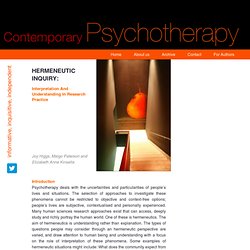
The selection of approaches to investigate these phenomena cannot be restricted to objective and context-free options; people’s lives are subjective, contextualised and personally experienced. Many human sciences research approaches exist that can access, deeply study and richly portray the human world.